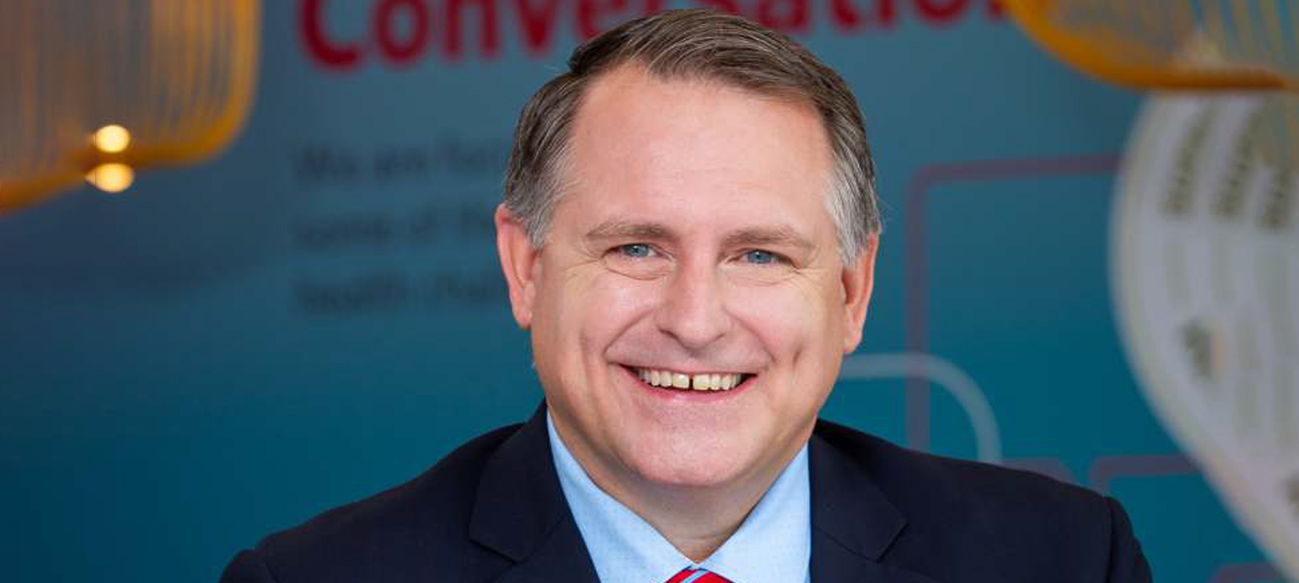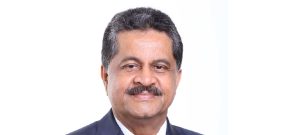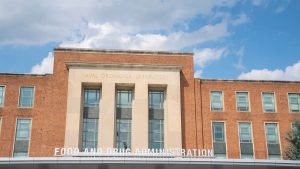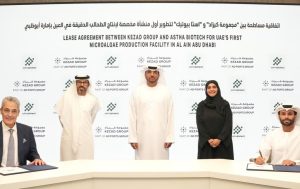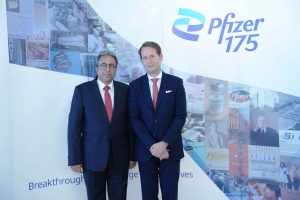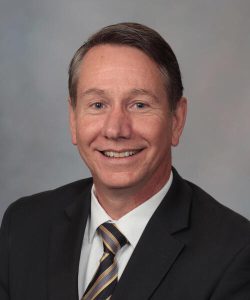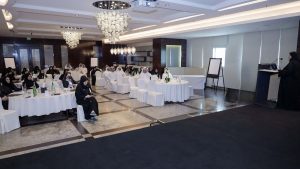“In the pursuit of an HIV cure, our research explores novel strategies, including long-acting injectables. Our collaborations extend beyond medicines alone, addressing barriers to access and inequities in healthcare systems. To truly end HIV, it takes collective efforts, and our partnerships with communities globally are key to achieving this goal.”
– Dustin Haines, Gilead VP and GM Middle East.
Gilead Sciences has played a pivotal role in the global fight against viral diseases, particularly in areas such as Asia, the Middle East, Russia, and Turkey. As a leading pharmaceutical company, Gilead is committed to advancing research and developing innovative treatments to tackle diseases such as HIV and viral hepatitis.
The company’s approach goes beyond just developing drugs; it involves fostering partnerships with communities and advocating for public health on a global scale. This approach not only benefits patients worldwide but also contribute to the shifting panorama of disease management. With a focus on advancing research and supporting emerging faculty researchers, Gilead is at the forefront of pioneering new approaches toward treating and preventing viral diseases.
Mediworld ME had the opportunity to sit down with Dustin Haines, the Vice President and General Manager of Gilead Sciences for Asia, Middle East, Russia, and Turkey, to gain insights into the company’s approach and vision for addressing challenges on a global scale.
Mediworld: Gilead Sciences is recognized as a global leader in developing antiviral drugs. Can you share some insights into the company’s approach to tackling viral diseases on a global scale, and how this approach benefits patients worldwide?
Gilead is deeply committed to virology and our mission is to end the HIV epidemic and eradicate viral hepatitis. To achieve this goal, we know that we will need to continue bringing together scientific innovation with community partnerships and public health advocacy in all parts of the world. The nature of disease management is evolving every day, so too must we bring new approaches and voices to the discussion.
For example, in HIV, our ongoing research, including the exploration of long-acting injectables for treatment and prevention, is advancing our knowledge toward a potential cure. We are also investing in programs like the Gilead HIV Research Scholars Program, offering research grants to emerging faculty researchers.
Another example is the Zeroing In grant program that supports organizations whose programs align with ‘Ending the HIV Epidemic’ (coordinated by the U.S. Department of Health and Human Services) goals. The program powers impactful community-driven projects and coalition-led proposals that aim to move us closer to a world free from HIV.
This approach carries over to the UAE and across our therapeutic areas. In 2018 Gilead joined MOHAP’s efforts to eliminate Hepatitis C by 2030 with its ‘Ready to be Cured’ campaign which sought to transform the eradication process through HCV cure therapies.
We introduced treatments that offer patients a positive chance of being cured. These therapies, comprising direct-acting antivirals (DAA), represent a significant step forward, ensuring a sustained viral response and halting the progression of liver diseases like cirrhosis. Additionally, our research for an HBV cure is ongoing. Our ALL4LIVER grant program offers funding to organizations dedicated to enhancing viral hepatitis testing, strengthening connections to care, and deepening the comprehension of viral hepatitis as a pressing public health concern.
Our current pipeline is strong and diversified. Gilead is on course to fulfill the ambitious goal we set in 2019—to deliver 10 or more transformative therapies by the year 2030. Our goals in the Middle East are in line with this approach, bringing together ambitious targets, scientific excellence, and partnerships – with community organizations, medical professionals, governments, and the wider industry – to pool our resources and expertise, and advocate to shape policies that enable patients to have access to essential treatments and that effective preventative measures are in place.
Mediworld: Gilead’s work in developing a potential HIV cure has garnered significant attention. Could you elaborate on the progress and promise of this groundbreaking research?
Gilead Sciences has always been at the forefront of HIV research. In February 2023, we announced results from four collaborative studies that delved into novel investigational combinations and strategies for a potential cure. These studies aimed to target the HIV viral reservoir and enhance the immune response, maintaining virologic control even without the aid of antiretroviral therapy. Presented at the Conference on Retroviruses and Opportunistic Infections (CROI) 2023 in Seattle, the findings are a testament to our multi-faceted approach in the pursuit of an HIV cure.
While this research is ongoing, we continue to innovate in medicines for treatment and prevention with the goal of reducing new HIV infections. In parallel, we know that delivery of medicines alone will not end the HIV epidemic. That’s why our partnerships with community organizations around the world to address barriers to access and inequities in healthcare systems is key. We recognize it takes all of us working together to truly end HIV.
Mediworld: As the VP and GM of Asia, Middle East, Russia, and Turkey, you oversee diverse markets. How do you manage the varying healthcare needs and regulatory landscapes across these regions to ensure Gilead’s therapies reach patients effectively and equitably?
Healthcare needs and regulatory environments vary significantly across these regions, presenting both challenges and opportunities. This diversity requires a tailored approach for each market, ensuring that our strategies are both effective and relevant. Healthcare infrastructure might not be uniform across these regions, nor within them, considering their vastness. For example, the GCC currently boasts a robust healthcare system and proactive governments which leads the way in many emerging conversations.
One of the key strategies we employ is fostering cross-regional dialogues and collaborations. By bringing together stakeholders from different countries, we facilitate a platform for mutual learning and growth. This allows us to be nimble and identify bespoke solutions rather than searching for a ‘one-size-fits-all’ approach.
Our discussions on hepatitis followed a similar collaborative approach. It’s not always about reinventing the wheel; sometimes, it’s about understanding what works in one ecosystem and seeing how it can be adapted or improved for another. Whether it’s financial resources, educational initiatives, or policy advocacy, our goal is to ensure that we leverage our collective strengths to address the unique challenges of each market.
Mediworld: Gilead has been actively expanding its footprint in the Middle East. Can you shed light on the company’s vision for further growth and collaboration in the region, and how this aligns with improving healthcare outcomes?
Gilead Sciences has been steadfast in its commitment to expanding its presence and impact in the Middle East. Since our establishment in the region in 2014, we’ve secured over 50 active licenses and provided treatment to nearly 96,000 patients across our core therapeutic areas. Today, our team in the Middle East comprises 55 dedicated employees spanning 12 markets.
Over the years, we have made significant strides in delivering treatments in the region for a range of diseases including HIV, HBV, and COVID-19. Additionally, we delivered a cure for HCV that public health experts believe can eliminate the disease. This is in line with WHO’s goal of eliminating viral hepatitis by 2023. Through Kite Pharma, we are bringing CAR T therapy to cancer patients in Saudi Arabia. As Gilead continues to make headway in the field of oncology, we are eager to expand our services and reach even more patients in need in this region.
In line with our global approach, we will be focused on not only providing treatments but also broadening access for patients in the Middle East. This might be done with strategic partnerships with healthcare agencies and relevant governmental institutions to drive awareness and accessibility, as demonstrated by our recent Memorandum of Understanding (MoU) with the Emirates Oncology Society, and our consistent collaboration with government programs such as the Saudi National AIDS Program (Saudi NAP).
We are acutely aware of the substantial unmet medical needs within the region and remain steadfast in our commitment to enhancing health outcomes for everyone. In essence, Gilead is here for the long haul, and our vision for the Middle East is focused on making lasting impacts and ensuring that every individual in the region has access to the best possible care.
Mediworld: Clinical trials are crucial for advancing healthcare research. Could you highlight any specific clinical trials or research collaborations in the Middle East that Gilead is involved in, and how these initiatives contribute to advancements in healthcare in the region?
In the Middle East, Gilead has been at the forefront of numerous research initiatives. Between 2015 and 2022, we supported more than 10 medical publications in the region to share scientific knowledge across our therapeutic areas. We continue to focus our efforts in encouraging the generation of local data, which is paramount to understanding the unique healthcare needs and challenges of the region.
In addition to research publications, we have actively collaborated with key scientific societies in the Middle East. This collaboration has led to our support for over 35 conferences and the initiation of more than 30 state-of-the-art CME-accredited symposia across various countries and therapeutic areas. These platforms provide invaluable opportunities for healthcare professionals to share knowledge, discuss the latest research findings, and collaborate on future studies.
Mediworld: The Middle East is a diverse region with varying healthcare needs. How does Gilead tailor its approach to address the specific health challenges faced by different countries in the region?
One of the foundational pillars of our approach in the Middle East is the generation of local data. As mentioned earlier, we have supported more than 10 medical publications on HIV, HBV, invasive fungal infections, HDV, liver disease, and HCV between 2015-2022. These included forecasts on HIV challenges from the perspectives of local experts, observational studies on HBV patients, and studies on managing nonalcoholic fatty liver disease in the Middle East. This data help to ensure that our interventions are both relevant and impactful, addressing the unique challenges and needs of patients in the region.
To make sure we are truly understanding the local context, Gilead works closely with public health officials, community advocates, and healthcare providers across the Middle East. Currently, the ongoing ALL4LIVER grant supports initiatives addressing one or more forms of viral hepatitis – HCV, HBV and HDV. By fostering these partnerships, we can bring our global scientific breakthroughs to the Middle East while ensuring they are adapted and optimized.
Mediworld: Could you highlight some of Gilead’s key initiatives or partnerships in the Middle East that have made a significant impact on healthcare delivery or patient access to medicines?
One of our most impactful campaigns was the “Ready to be Cured” initiative, conducted in Saudi Arabia, UAE, and Kuwait. This campaign aimed to raise public awareness about Hepatitis C, emphasizing the importance of testing and supporting HCV patients in their journey towards a cure.
Gilead Sciences ME also signed a MoU with the Saudi MoH in 2022 aiming to support five priorities for the optimization of the HIV care pathway (awareness, testing, treatment initiation, patient counseling and patient data) and we are working on several workstreams in parallel to implement key initiatives in collaboration with the National AIDS Program. Furthermore, our collaboration with East Jeddah hospital ensured home delivery of HIV treatments to 1,400 patients to support continuation for HIV patients who were not able to commute to healthcare facilities during the COVID pandemic.
Gilead’s ethos also extends beyond medicine; we are committed to giving back to the communities we serve. Notably, we provided a grant program to the “Sharjah Red Crescent Medical Center” in the UAE to support patients with liver diseases. In response to the global COVID-19 pandemic, Gilead donated 1.5 million doses of its approved antiviral treatment for hospitalized patients, benefiting countries in the Middle East.
Mediworld: Looking ahead, what are Gilead’s aspirations and goals for the Middle East, and how does the company plan to contribute to the continued improvement of healthcare outcomes in the region?
The Middle East holds great potential for achieving health equity due to its rapidly growing and urbanizing population, significant economic growth, and dedication to further developing its healthcare sector. We will continue to be a collaborative partner, across all sectors, to improve health for people in the region. We are also investing in our employees to ensure we are maximizing our impact. Gilead has some of the best and brightest teams in the industry and they are critical to our collective success in the Middle East and beyond.

